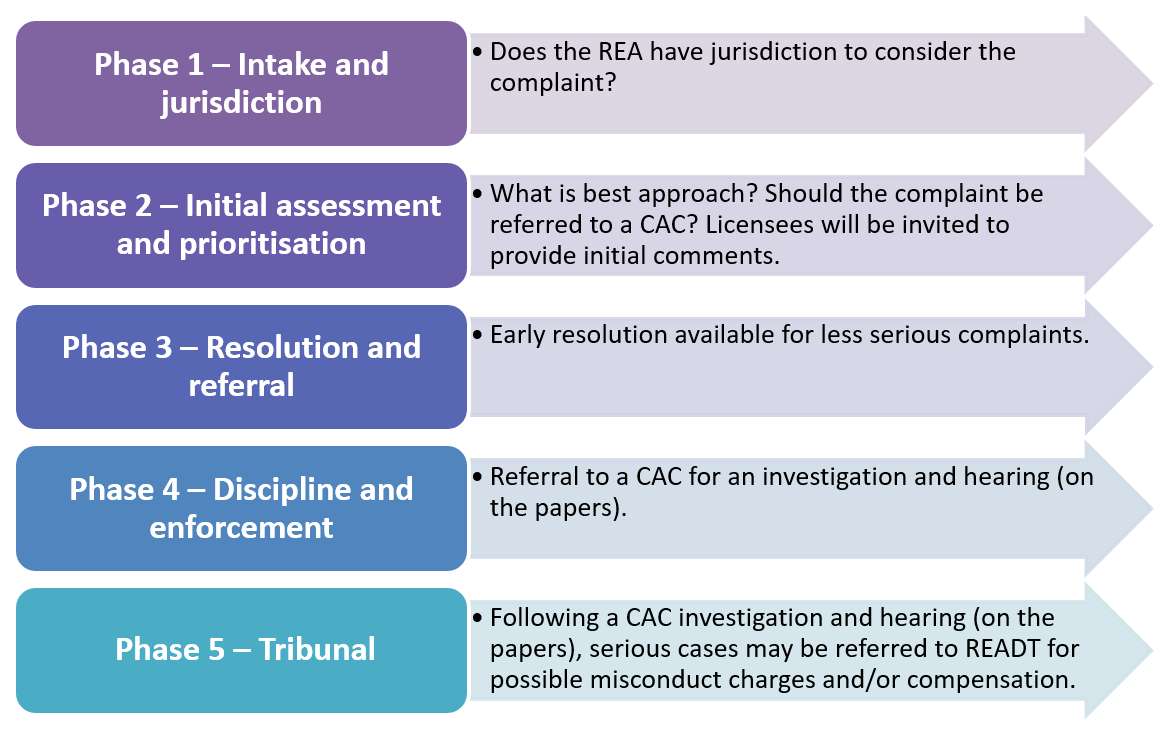At a glance
- On 16 October 2023, the REA will adopt a new process for handling complaints against real estate agents.
- Under the new process, there will be an earlier opportunity for licensees to make their case to have a complaint dismissed.
- The REA is also adopting new timeframes for responses to complaints that have been referred to a CAC.
- The threshold for referral to a CAC has not changed. However, by allowing licensees to comment on complaints at an earlier stage, licensees may be able to avoid a referral to a CAC.
Background
On 16 October 2023, the Real Estate Authority (the REA) is making changes to the complaints process “to address inefficiencies, improve timelines and increase effectiveness”.1 There has been no change to the Real Estate Agents Act, Regulations or the Code of Conduct.
The changes relate to how the REA processes complaints, with the key changes being the clearer role of the earlier stages of the complaint process. This includes allowing licensees to make their case to have a complaint dismissed at an earlier stage.
Previously, the steps taken by the REA before a referral to the Complaints Assessment Committee (CAC) were not clearly defined. The REA would typically make contact with the complainant to confirm the issues of complaint, make an initial assessment on whether to proceed the complaint, and (occasionally) try to resolve the complaint through an early resolution process.
If a complaint was not resolved through an early resolution process, the complainant could ask for it to be referred to a CAC. Often, a licensee would be required to proceed through to the CAC stage before they were asked to comment on the complaint.
The new process

- Phase 1 – intake and jurisdiction
The emphasis in this phase is on whether the REA has jurisdiction to consider the complaint. For example, if a complaint relates to a lawyer or a licensee’s personal conduct, the REA is unlikely to advance the complaint due to its lack of jurisdiction.
- Phase 2 – initial assessment and prioritisation
In this phase, the REA will assess the best approach to resolve the complaint, including consideration of whether the complaint should be referred to a CAC. Licensees will be invited to provide comments for this initial assessment. Before the complaint is referred to a CAC, the Registrar has the discretion to take no further action on inconsequential and frivolous and vexatious complaints.2
- Phase 3 – resolution and referral
In this phase, the REA can explore whether early resolution is possible. This option will only be available for less serious cases and the parties will need to agree to the early resolution process.
- Phase 4 – discipline and enforcement
Cases will be referred to a CAC if they are not closed by the Registrar or resolved at Phase 3.
- Phase 5 – tribunal
Following the CAC’s investigation and hearing (on the papers), serious cases may be referred to the Real Estate Agents Disciplinary Tribunal. These may involve misconduct charges and/or compensation claims.
Key changes
The key changes are at the initial stages of the complaint handling process. To increase the efficiencies and effectiveness of the process, the REA will seek initial comments from licensees when it receives a complaint to assist with its initial assessment. This is an opportunity for licensees to put forward any relevant information (i.e. if the complaint is frivolous or vexatious, or it has been resolved) and request that no further action be taken. The initial response is not mandatory, and licensees will be invited to make further submissions if the matter progresses to a CAC.
The REA will also set new timeframes for responses at each phase. The REA has indicated that it will seek initial comments within 5-10 working days for the initial assessment, 10 working days for the resolution process, and 15-20 days for submissions in the CAC process.
What the changes mean for licensees, agencies and insurers
The REA is providing an opportunity for licensees to address complaints at an earlier stage. If a referral to a CAC is not required, a complaint may be closed. Therefore, addressing a complaint properly with supporting documents — even if a complaint is seemingly minor — may avoid the risk of prolonged CAC investigation and the accompanying stress, time and costs.
If a licensee receives a REA complaint, it will be important to:
- advise the agency and seek assistance from insurers and lawyers as soon as possible – given the REA’s intention for the new process, it may be more difficult to obtain extensions for the provision of responses
- engage in the complaint handling process and provide a response early, particularly if there is a basis to say the complaint is inconsequential, or is frivolous and vexatious. If a complaint is minor and need not be referred to a CAC, licensees should bring this to the REA’s attention and front foot any issues at the earlier stage.
- identify relevant documents to support a response early – taking this step early could save significant time and effort if it results in the REA taking no further action at Phase 2, and
- if the REA refers the complaint to a CAC, ensure the consistency of responses at the earlier and later stages.
Agencies should review and update their internal processes for managing complaints to ensure they can meet the new timeline for responses and submissions. This may include following up with licensees if their response is required, ensuring that all licensees provide input as soon as they can (if multiple licensees are involved in one complaint), collating supporting documents as soon as possible, and seeking early assistance from lawyers or insurers.
Collating supporting documents and drafting properly articulated responses can be time-consuming. Insurers will need to be aware of the new timeframes when instructing lawyers to provide sufficient time for them to meet the relevant deadlines.
[1] https://mail.rea.govt.nz/t/j-A5FCD1336238F6482540EF23F30FEDED
[2]Section 74(3) of the REA Act.